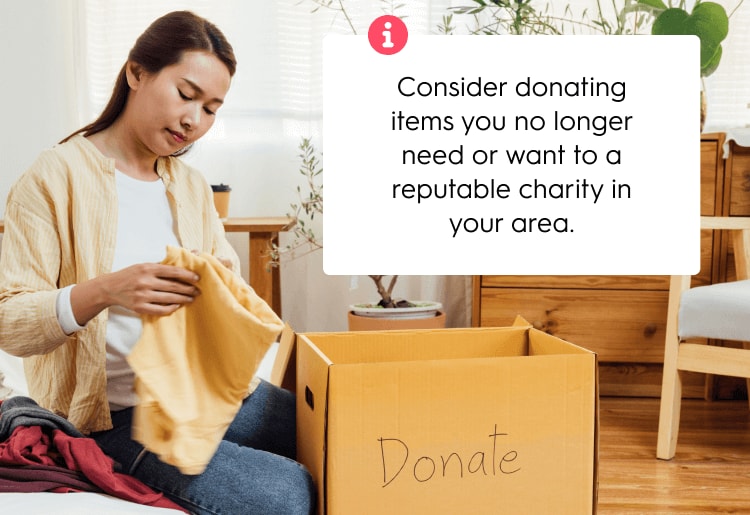People often throw away items that could've been recycled or donated, like functional furniture, electronics, and non-perishable food. In fact, furniture alone accounts for over 12 million tons of waste in US landfills each year.
As a seasoned real estate professional, I've gained extensive knowledge about selecting moving companies and implementing strategies that minimize environmental impact. Drawing from this experience, I can provide expert tips to make your upcoming move as eco-friendly as possible.
» Need professional help? Here's how to check if a moving company is legit.
Adopt a Single Truckload Approach
Minimizing your environmental impact during a move starts with ensuring you can transport everything in a single truckload. Donating unwanted items or downsizing belongings you won't need at your new home can also reduce the overall load.
This has the added benefit of lowering emissions from hauling excess stuff. You can also recycle leftover paper, cardboard, and packing materials to limit your environmental impact after your move.
Choose Environmentally Conscious Movers
Look for companies that prioritize sustainability in their practices. For example, American Van Lines encourages employees to carpool and coaches dispatchers to plan efficient routes to reduce fuel consumption.
Ask if they can provide you with used boxes instead of new ones. Or, ask if the company's crews can access reusable totes and bins instead of cardboard boxes. You can also find out if the mover avoids tape or uses biodegradable packaging instead of Styrofoam and single-use paper or plastic wrap.

A List of Eco-Friendly Moving Companies
- Allied Van Line's website offers eco-friendly moving tips. It's also driver-focused, so crews reuse boxes and blankets instead of single-use wrapping and covers whenever possible.
- Colonial Van Lines is leveraging technology to reduce its environmental impact. Not only is it cutting down on paperwork, but it wants an all-electric fleet by 2028.
- International Van Lines has significantly reduced paperwork by going digital. The company gives estimates through online virtual tours and uses digital communication.
Choose Eco-Friendly Packing Options
Reusable Plastic Bins
Invest in reusable plastic bins for a sustainable packing solution. These durable containers can be used for multiple moves, eliminating the need for single-use cardboard boxes that often end up in landfills.
You can purchase these bins online or at local packaging and moving supply stores. Alternatively, consider renting it from companies like U-Haul. It offers convenient drop-off and pick-up services in many major cities.
Recyclable Cardboard Boxes
If you prefer using cardboard boxes, opt for easily recyclable and biodegradable ones. Many companies, such as U-Haul, offer free boxes through their "Take a Box, Leave a Box" program at their store locations. You can also find free or low-cost moving boxes through online exchange forums.
Creative Packing Materials
Instead of purchasing new packing paper, wrap and protect your items with newspapers. Ask your local grocery store if they have any unsold copies they can give you at the end of the day.
For a more eco-friendly alternative to single-use packing materials, use recycled pads to safeguard your furniture during the move and prevent scratches and damage.
If you must use plastic bubble wrap, choose U-Haul's Enviro-Bubble, which is 100% recyclable and made from recycled polyethylene.
Use Existing Containers
Use empty suitcases, backpacks, and duffle bags to carry lighter items, reducing the need for extra boxes or packaging materials. Leave clothing in dresser drawers and fill empty trunks or nightstands with lighter household goods.
Instead of using additional packaging, wrap breakable items with towels, sheets, and blankets you already own.

Declutter Your Space Before a Move
Decluttering your space is an essential part of your relocation. It can streamline the process and help you start fresh in your new home.
Start by mapping out where your belongings will go in your new house and thoughtfully examine the items you're not currently using. Consider whether you'll need them in the future. If not, it's time to let them go.
You can donate them to charity or hire a junk removal service to take them away. This approach will lighten your load and ensure you have only the essentials in your new space.
» Learn how junk removal services work to support eco-friendly practices.
Donate Unwanted Items
Moving often uncovers items you no longer need or want. Instead of throwing them away, consider donating them to someone in need.
According to Dr. Patricia Boyle, a neuropsychologist at the Rush Alzheimer's Disease Center, donating helps the planet and improves your psychological and physical health.
Many charities provide free furniture donation pick-ups. Consider these options for donating:
- Local church groups and shelters
- Habitat for Humanity
- Salvation Army
- Goodwill
- Pickup Please

Additional Tips for Eco-Conscious Moving
- Designate separate areas: As you unpack in your new home, set aside specific recyclable and non-recyclable waste spaces to keep them organized.
- Flatten used boxes: After unpacking, break down the empty boxes and flatten them. This will make it easier to transport them to the nearest recycling center.
- Reuse packing materials: Box or bag up reusable packing materials like bubble wrap, paper, or peanuts and store them until your next relocation. This is one of the best ways to save money when moving, as you won't need to purchase as many new supplies.
- Use a moving checklist: Incorporating a to-do list into your strategy can streamline the entire process, minimize waste, and ensure your relocation is as green as possible.
Green Moving Made Easy
The idea behind a green move is to be conscious of your carbon footprint. Whether it's a local move or a long-distance one, sustainability is key. Make eco-friendly choices like using biodegradable moving boxes and partnering with truck rental companies with low-emission vehicles.
Consider looking for ways to reuse packing materials and recycle what you can't reuse. Even small decisions can collectively make a positive impact on the planet.
» Feeling overwhelmed? Follow this A-Z guide for what to do when moving.

